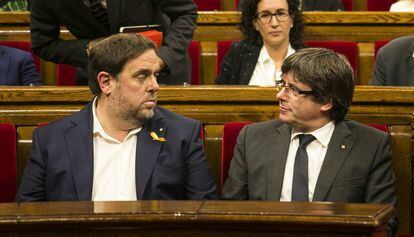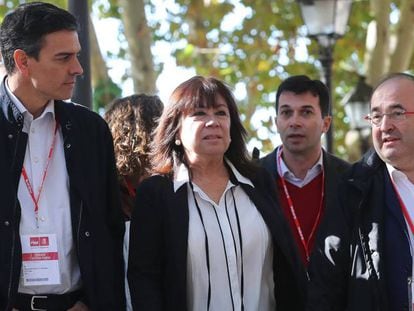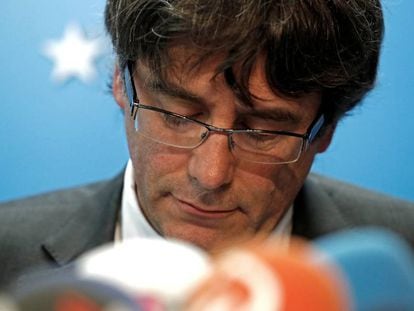Separatist leader eyes alliance with Barcelona mayor’s party after Catalan election
Oriol Junqueras, of Catalan Republican Left (ERC), is exploring post-vote deal with Catalunya en Comú

Five weeks out from regional elections in Catalonia, the leader of the pro-independence Catalan Republican Left (ERC), Oriol Junqueras, has hinted at a possible post-electoral alliance with the party of Barcelona mayor Ada Colau, Catalunya en Comú.
Although the two groups are seriously divided over the independence issue, such a partnership would be a huge shot in the arm for the ERC as it seeks to obtain the prized regional premiership. It could also benefit Catalunya en Comú, which is jockeying for position in a bid to occupy the uneasy middle ground between those who favor and oppose independence for Catalonia.
We didn’t think the state would dare to apply these levels of oppression Former deputy premier of Catalonia, Oriol Juqueras
In a letter sent from the Madrid prison where he is currently being held in pre-trial custody, after being formally accused of crimes including rebellion and sedition for his role in promoting the Catalan independence push, Junqueras, the former deputy premier of Catalonia until his recent sacking by Madrid, stated he would not run for the regional premiership and named ERC party general secretary Marta Rovira as his preferred successor.
At the same time, Junqueras, whose party is riding high in the polls but who will need new partners for any possible majority government, also mentioned the possibility of post-election synergies with Catalunya en Comú, the party forged by Ada Colau and the leader of the Spain’s anti-austerity party Podemos, Pablo Iglesias, to contest the pre-Christmas vote.
While he didn’t mention the party by name, the former second-in-charge to sacked Catalan premier Carles Puigdemont – currently in Belgium and set to appear before a judge on Friday at a hearing to decide on his arrest and possible extradition to Spain – spoke of a possible rapprochement with those “who sadly put the [unilateral declaration of the independent Catalan] republic on the same level as 155.” Article 155 is the provision of the Spanish Constitution that has been used by Madrid to call a snap election in Catalonia and oust members of the regional government.
A partnership with Catalunya en Comú would be a huge shot in the arm for the ERC as it seeks to secure the prized regional premiership
This is a direct allusion to Ada Colau who has, in recent days, taken care to distance herself both from those parties – including the ERC, which supported the recent universal declaration of independence – as well as from those parties that back Madrid’s use of Article 155, a group that includes the Catalan Socialists (PSC), Spain’s ruling Popular Party (PP) and the center-right Ciudadanos.
But with the former ruling Junts pel Sí coalition in Catalonia – which was made up of the ERC along with the party of Puigdemont, PDeCAT, and supported by the radical left-wing CUP – now a thing of the past, Junqueras recognized he had to “hold out a hand” to Colau’s party “no matter how painful and incomprehensible their attitude sometimes is.”
Junqueras did not mention the recent decision by Colau’s party to break up its partnership with the Socialists in Barcelona City Hall but there is no doubt this facilitates any possible discussions between ERC and Catalunya en Comú.
In his letter, the sacked deputy premier said the independence movement had been “naive” in terms of its strategy
But he did note the previous legislature had seen the presence of “new allies” who were “not necessarily pro-independence but unequivocally democrats,” and cited the example of the illegal October 1 independence referendum. This is another reference to Colau, who, after a lot of hesitation, agreed to accept the vote as a form of citizen protest and allowed Barcelona city premises to be used as polling stations.
In his letter, the sacked deputy premier also said the independence movement had been “naive” in terms of its strategy.
“We didn’t think the state would dare to apply these levels of oppression. Or that the European Union would tolerate the PP government, in the name of the unity of Spain, taking so much tough action against the people and institutions of Catalonia,” he wrote.
English version by George Mills.












































